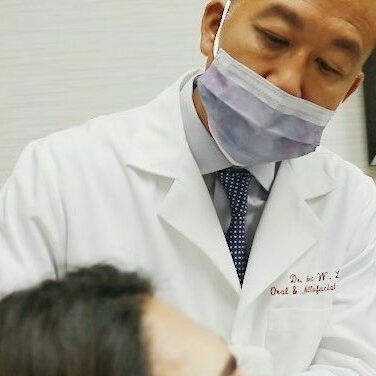After Wisdom Tooth Removal

Ready to Make an Appointment?
Contact Us Today!
Call Us
What to do After Wisdom Tooth Removal
Extraction of teeth or other oral surgeries are serious procedures. Postoperative care is very important and to prevent complications and unnecessary pain, discomfort and expense, the following instructions should be followed closely to insure proper healing.
KEEP THE MOUTH CLEAN
Do not do any rinsing of the mouth or brushing of teeth for 24 hours after surgery. The day after surgery use a solution of ½ teaspoon of salt in a glass of warm water as needed, not too vigorously, since they may dislodge the blood clot and possibly delay healing. Resume brushing teeth the following day. Stitches will dissolve in 5-10 days.
BLEEDING
Following oral surgery, slight bleeding or oozing for the first day is not uncommon. Place a roll of gauze over the wound and bite down firmly for at least two hours. Do not spit or rinse. This only makes the bleeding worse. Swallow normally; the fluids will not hurt you. If bleeding continues after trying the above, bite on a moistened tea bag for 20 minutes. The tannic acid in the tea bag helps to form a clot by contracting bleeding vessels. Do not become excited, but rather lie down with your head elevated on three pillows. If bleeding does not subside, call for further instructions.
PAIN
For severe pain, take tablets prescribed for pain. For moderate pain, take 800mg of Ibuprofen 3 times a day with food or juice. If a prescription was given, please use as directed. The prescription for pain will make you a little groggy and will slow down your reflexes. Do not drive an automobile or work around machinery. Move about slowly. If you suddenly sit up or stand up from a lying position, you may become dizzy. Without infection or other complications, the discomfort following an extraction or other surgery will usually disappear in a few days. However, if pain or swelling continues, it may require attention and you should call the office.
ANTIBIOTICS
If you have been given a prescription for an antibiotic, take the entire prescription as directed. The drugs you may be given will minimize swelling, reduce discomfort, prevent infection and promote healing. Discontinue only in the event of a rash or other unfavorable reaction and call our office immediately. NOTE: Antibiotics may reduce the effectiveness of birth control pills. Please use other forms of birth control until you start your next pack of pills.
SWELLING
Swelling is a normal response following surgery, but can be partially avoided by using an ice pack for the first 72 hours after surgery. You should put it on for 20 minutes and take it off for 20 minutes, as much as you can during that time. Maximum swelling normally occurs on the 3rd day following surgery. A hot water bottle or heating pad should be used starting on the 4th day after surgery to help bring the swelling down. Some temperature rise is to be expected after surgery.
DISCOLORATION
You may develop black, blue, green or yellow discoloration resembling a bruise in the tissue. This is due to a slight oozing of blood beneath the tissues and is of little significance. This is a perfectly normal postoperative event. It should be treated the same as swelling.
FLUIDS
Dehydration must be guarded against when having oral surgery, since a patient’s solid food intake is limited the first day. It is necessary to compensate for this by increasing the fluid intake (at least five to six glasses of fluid should be taken). Suggested food for the day of surgery: yogurt, pudding, jello, instant breakfast, milk, malts, ice cream and applesauce. The day after surgery diet should consist of soft foods such as soups, eggs, cottage cheese, pasta and a hamburger patty.
NAUSEA
In the event of nausea from taking pain medication, keep something light in your stomach such as broth or saltines. Do not get up and move around more than necessary. Call our office if nausea persists.
IMPACTED OR BURIED TEETH
The following conditions are not uncommon with removal of these teeth: difficulty in opening your mouth due to muscle spasms. If a lower impaction was removed, you may have numbness of the lower lip or tongue on the side from which the tooth was removed. This is almost always a temporary condition. It is not disfiguring, but can be annoying. It may last from a few days to many months. After removal, the adjacent teeth may realign themselves, causing some discomfort or sensitivity. Sores may develop at the corner of the mouth and these should be covered with a mild ointment (Vaseline).
SHARP BONY EDGES
Occasionally patients will place their tongues on an operation site and feel a hard substance, which they think is a part of a tooth. It is the hard, bony wall that originally supported the tooth. Leave it alone and it should heal nicely.
IF YOU ARE IN DOUBT ABOUT ANYTHING AT ANY TIME, PLEASE CONTACT OUR OFFICE.
Post Operative Care Instructions
DOs
- DO rest today and tomorrow; half speed on the third day.
- DO place ice on jaws for 72 hours (20 minutes on/20 minutes off).
- DO use pressure on gauze packs for 2 hours and then as needed.
DON’Ts
- DON’T smoke, dip or chew tobacco.
- DON’T use drinking straws.
- DON’T drink carbonated beverages.
- DON’T use alcohol or mouthwash.
- DON’T lift, bend, strain or play sports.

